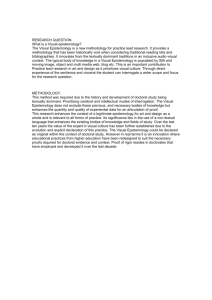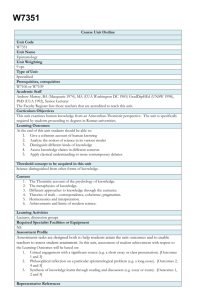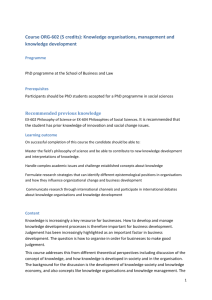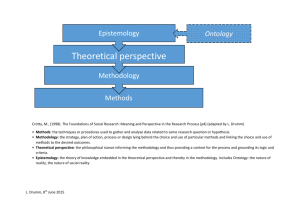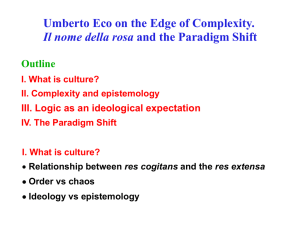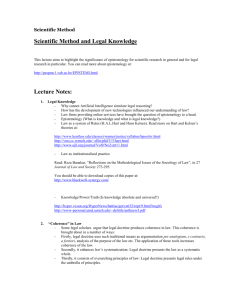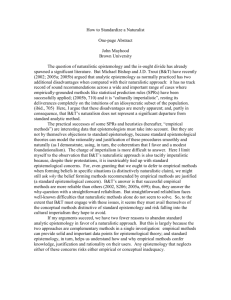MODULE SPECIFICATION TEMPLATE
advertisement
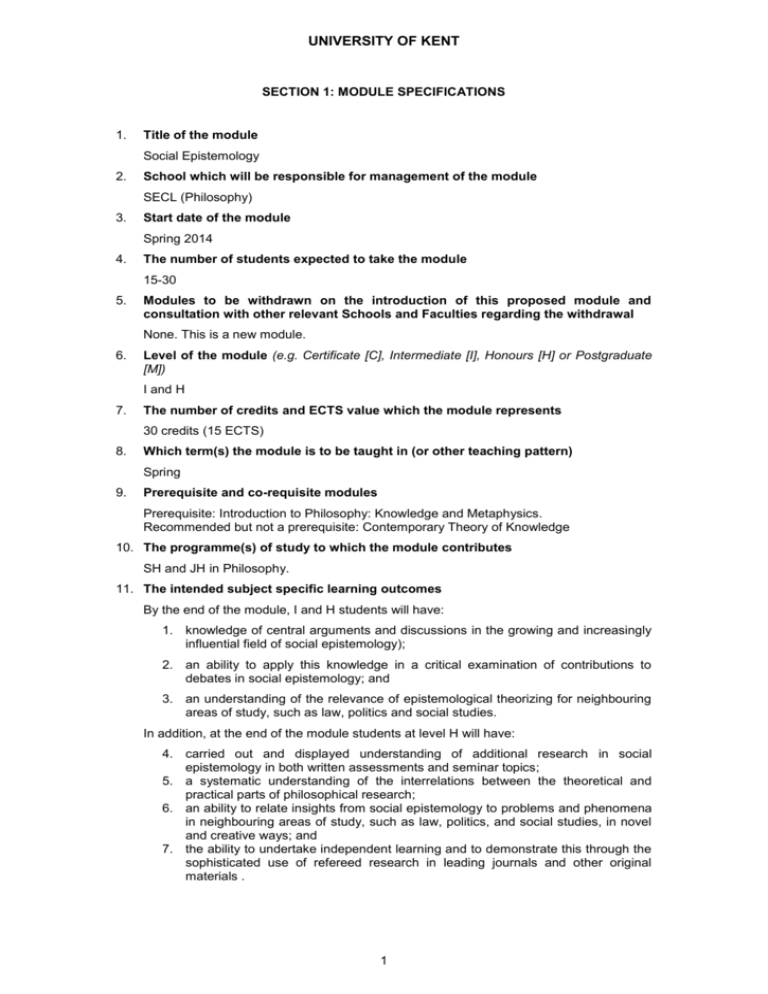
UNIVERSITY OF KENT SECTION 1: MODULE SPECIFICATIONS 1. Title of the module Social Epistemology 2. School which will be responsible for management of the module SECL (Philosophy) 3. Start date of the module Spring 2014 4. The number of students expected to take the module 15-30 5. Modules to be withdrawn on the introduction of this proposed module and consultation with other relevant Schools and Faculties regarding the withdrawal None. This is a new module. 6. Level of the module (e.g. Certificate [C], Intermediate [I], Honours [H] or Postgraduate [M]) I and H 7. The number of credits and ECTS value which the module represents 30 credits (15 ECTS) 8. Which term(s) the module is to be taught in (or other teaching pattern) Spring 9. Prerequisite and co-requisite modules Prerequisite: Introduction to Philosophy: Knowledge and Metaphysics. Recommended but not a prerequisite: Contemporary Theory of Knowledge 10. The programme(s) of study to which the module contributes SH and JH in Philosophy. 11. The intended subject specific learning outcomes By the end of the module, I and H students will have: 1. knowledge of central arguments and discussions in the growing and increasingly influential field of social epistemology); 2. an ability to apply this knowledge in a critical examination of contributions to debates in social epistemology; and 3. an understanding of the relevance of epistemological theorizing for neighbouring areas of study, such as law, politics and social studies. In addition, at the end of the module students at level H will have: 4. carried out and displayed understanding of additional research in social epistemology in both written assessments and seminar topics; 5. a systematic understanding of the interrelations between the theoretical and practical parts of philosophical research; 6. an ability to relate insights from social epistemology to problems and phenomena in neighbouring areas of study, such as law, politics, and social studies, in novel and creative ways; and 7. the ability to undertake independent learning and to demonstrate this through the sophisticated use of refereed research in leading journals and other original materials . 1 UNIVERSITY OF KENT 12. The intended generic learning outcomes and, as appropriate, their relationship to programme learning outcomes By the end of the module, I and H students should: 1. have developed their skills in critical analysis and argument through an engagement with the relevant issues, both through their reading and through listening to others; 2. have developed their ability to make complex ideas clearly understandable in their philosophical writing ; 3. have developed their ability to make complex ideas clearly understandable in their public speaking; and 4. have developed their ability to work autonomously and to take responsibility for their learning . In addition, H level students should: 5. demonstrate greater independence in applying the knowledge acquired, for example by seeking out further research on their own in an effective and critical manner; 6. engage with the information acquired independently in a manner that demonstrates a good sense of the considerations relevant to current discussions in social epistemology; and 7. present their thoughts and arguments, both in oral and written form, with an even greater clarity and coherence than what can be expected at the I level (. 13. A synopsis of the curriculum Much of modern epistemology—i.e., the theory of knowledge—has taken its cue from Descartes in focusing on the individual knower, striving to attain knowledge through solitary meditation. Still, knowledge is typically attained in cooperation with others. This module provides an introduction to some of the main topics in social epistemology, a new and increasingly influential field that takes seriously this social character of knowledge. Questions to be addressed within the framework of the module include but are not limited to: What are the conditions under which we can come to know things by relying on the word of others? What experts should we trust? When we encounter people that disagree with us, to what extent should that lead us to abandon our own convictions? And are the ways in which we are socially situated, e.g., as people of a particular race or gender, relevant to what we can be said to know? The module will also consider a number of topics in applied social epistemology, e.g., as it pertains to the epistemic merits and problems with Wikipedia, the epistemology of free of speech, and epistemological questions arising within the law. 14. Indicative Reading List Readings will be taken from the following books: Alvin Goldman and Dennis Whitcomb (eds.) Social Epistemology: Essential Readings (Oxford: Oxford University Press, 2011). Richard Feldman and Ted Warfield (eds.) Disagreement (Oxford: Oxford University Press, 2010). Jennifer Lackey and Ernest Sosa (eds.) The Epistemology of Testimony (Oxford: Oxford University Press, 2005). 15. Learning and Teaching Methods, including the nature and number of contact hours and the total study hours which will be expected of students, and how these relate to achievement of the intended learning outcomes 2 UNIVERSITY OF KENT The module will be taught on the basis of a two hour lecture and one hour seminar (33 class contact hours). Allowing for preparatory reading for seminars and independent work for the essays, the total study hours will be 300 hours. These learning and teaching methods satisfy learning outcomes 11.1-7 and 12.1-7 16. Assessment methods and how these relate to testing achievement of the intended learning outcomes 1) A final essay of a maximum of 2,000 words (45%). Handed in end of term. (SSLO: 17, GLO: 12.1-2, 12.4-7) 2) A mid-term essay of a maximum of 2,000 words (45%). (SSLO: 1-7, GLO: 12.1-2, 12.4-7) 3) Seminar Presentation (10%). Assessed through a small group presentation. (SSLO: 1-7, GLO 12.1,12.3,12.7) I and H level students will have to choose their essay questions from different sets of questions. This will be the main way in which the module will distinguish the two sorts of student. The different sets may partly be distinguished in terms of the topics on which the questions are set, H level students obviously been made to discuss harder topics than I level students. In addition, H level questions may make explicit reference to articles and books that require discussion and which analogous I level questions will omit. (I level students may make reference to the cited works, but need not in order to get a mark at a similar level.) 17. Implications for learning resources, including staff, library, IT and space None, beyond the library needing to order in a few new anthologies in social epistemology (see 14. above). 18. The School recognises and has embedded the expectations of current disability equality legislation, and supports students with a declared disability or special educational need in its teaching. Within this module we will make reasonable adjustments wherever necessary, including additional or substitute materials, teaching modes or assessment methods for students who have declared and discussed their learning support needs. Arrangements for students with declared disabilities will be made on an individual basis, in consultation with the University’s disability/dyslexia support service, and specialist support will be provided where needed. 19. Campus(es) where module will be delivered: Canterbury SECTION 2: MODULE IS PART OF A PROGRAMME OF STUDY IN A UNIVERSITY SCHOOL Statement by the School Director of Learning and Teaching: "I confirm I have been consulted on the above module proposal and have given advice on the correct procedures and required content of module proposals" ................................................................ Director of Learning and Teaching .............................................. Date ………………………………………………… Print Name Statement by the Head of School: "I confirm that the School has approved the introduction of the module and, where the module is proposed by School staff, will be responsible for its resourcing" ................................................................. Head of School .............................................. Date ……………………………………………………. Print Name 3 UNIVERSITY OF KENT SECTION 3: MODULE IS PART OF A PROGRAMME IN A PARTNER COLLEGE OR VALIDATED INSTITUTION (Where the module is proposed by a Partner College/Validated Institution) Statement by the Nominated Officer of the College/Validated Institution (delete as applicable): "I confirm that the College/Validated Institution (delete as applicable) has approved the introduction of the module and will be responsible for its resourcing" ................................................................. Nominated Responsible Officer of Partner College/Validated Institution …………………………………………………. Print Name ………………………………………………….. Post …………………………………………. Partner College/Validated Institution Module Specification Template Last updated November 2011 4 .............................................. Date

